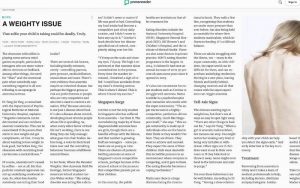Featured in The Soothe – 13th Oct, 2020
Read original article here
Both can be debilitating mental health issues, but it pays to understand their differences
Text: Anna A
Stress and anxiety: two words that are on everyone’s lips, especially throughout these unprecedented times. Both ignite feelings of ‘fight or flight’ in the body and reactions that can be make situations feel overwhelming and difficult in daily life — from big tasks like your job, to small issues such as what to have to eat at night. Yet, despite being linked, these two mental health issues are not the same.
About 10 per cent of the population in Singapore suffer from anxiety and depressive disorders according to Professor Lim, a Senior Consultant Psychiatrist, Department of Psychiatry, Singapore General Hospital (SGH). The Covid-19 pandemic has taken its toll on everyone: calls to Samaritans of Singapore rose by 30 to 35% throughout the circuit breaker period.
What is the definition of stress and anxiety?
When someone is going through stress, the body produces higher levels of chemicals such as cortisol, epinephrine, and norepinephrine which can cause physical changes such as sweating, higher blood pressure, quickness of breath and feeling tense. Stress is a very ‘normal’ feeling and something that happens to everyone as a reaction to change, demand or a threat. It’s impossible not to feel some level of stress at some point in your life and it exists on a spectrum. In its low level, stress can even be a good thing, as it motivates you, excites you and raises your concentration levels. However, a large and prolonged amount of stress is detrimental to your mental wellbeing. It can stop you sleeping, slow your digestion, lower your sex drive and alter your weight.
Anxiety is a feeling of fear or worry: it’s your body’s response to stress. Although researchers are not 100% sure of what causes anxiety, genetic and environmental factors play a large role, as well as your personal brain processes. “Ultimately, anxiety is the fear of our inability to control something,” confirms Maria Luedeke from Aspire Counselling.
So, how are they different?
Stress and anxiety tend to go hand-in-hand leading to tension, headaches, loss of sleep, a fast heartbeat, shaking, quickness of breath, and even a breakdown in your digestion causing stomach pain, constipation or diarrhea. For men, stress and anxiety can seriously affect testosterone levels resulting in less sperm being produced and erectile dysfunction. For women, stress can cause issues with the menstrual cycle leading to more painful, heavier or irregular periods.
Stress is a response to an external trigger such as a fight with a loved one, a tight deadline or a problematic situation, whereas anxiety is an excessive reaction to stress or fear and tends to be more internal. Hard to handle, anxiety can sometimes make you feel like you’re unable to function. Sufferers report anxiety attacks which can involve feeling faint, sweating or tingling and numbness in the body. Often, anxiety can be caused by something that isn’t controllable — like a thought, other people, or a future event.
Oh, and let’s not forget the impact on your general personality. Stress and anxiety can make you feel worried and concerned, giving you a total lack of confidence and making you feel socially anxious. Sufferers may want to avoid hanging out with friends, colleagues or family as they feel uncomfortable or even suddenly inadequate.
How to deal with them
“We all have a ‘base line’ of anxiety, but there are three ways of handling it: psychotherapy, changing your lifestyle or through medication prescribed by your GP,” explains Maria. Most people benefit from talk therapy but for those with a heightened sense of anxiety (and a higher ‘base line’), this can sometimes be difficult.
Look at your diet. Eating specific foods can have a positive effect on your mental health. A couple of ‘happy foods’ include:
-
Yoghurt as it contains plenty of beneficial bacteria which can improve your wellbeing
-
A cube (or two) of dark chocolate as its antioxidants benefit brain functionality
-
Almonds which contain vitamin E, that is proven to help with anxiety prevention
Maria highlights the importance of self-care when tackling stress as “this can help you manage your overwhelming feelings, whether they be feelings of excitement, fear or worry.”
Everyone defines self-care differently, however, she believes you can split it up into four different areas: physical, emotional, spiritual and intellectual. Whether it’s going for a run, going to church, or going for a cocktail, your self-care routine is what works best for you.
Importantly, it’s essential that you acknowledge feelings of stress or anxiety when they arise. If you’re feeling like you’re unable to cope and feel like your need help, please see your doctor. There are many medical professionals here in Singapore who can help you to understand what your triggers are and get you back on track.
If you suspect that you are facing mental-health related problems, you are strongly encouraged to seek professional help. In the case of an emergency, the SOS (Samaritans of Singapore) operate a 24-hour helpline on 1800 221 4444.





